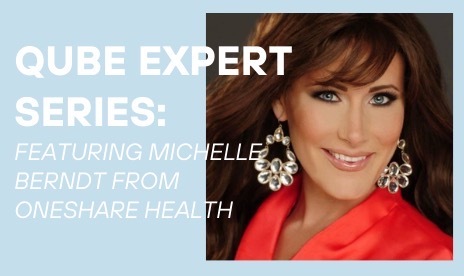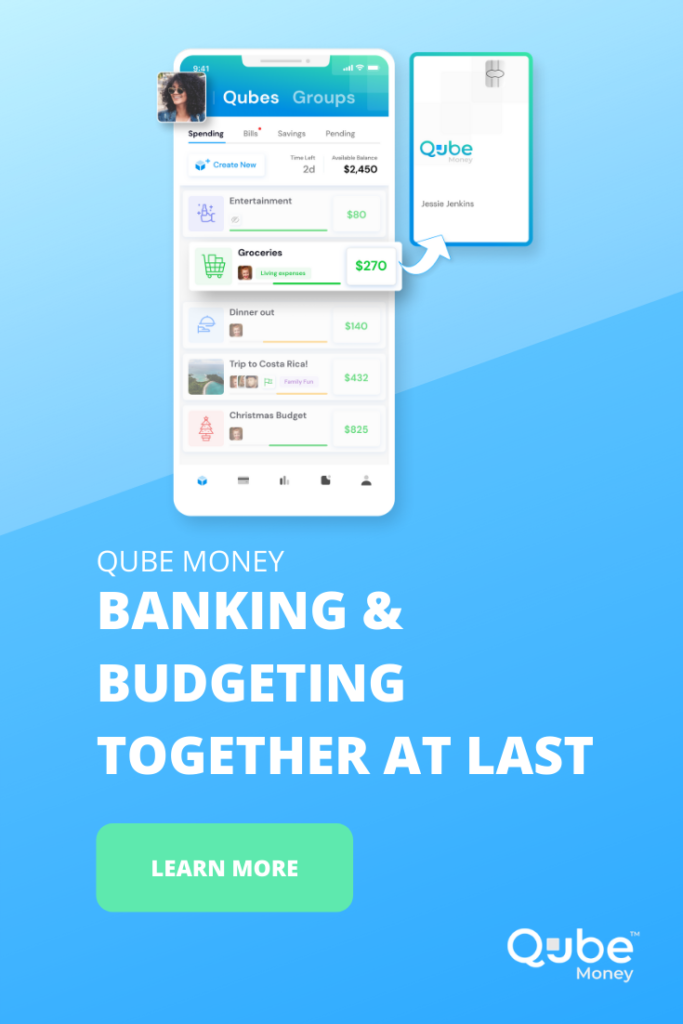Qube Expert Series:
Featuring
Michelle Berndt
Qube Money Expert Series with Michelle Berdnt
Our first guest for the Qube Money Expert Series is Michelle Berdnt, the Vice President of Strategic Development at OneShare Health! This is a transcription of Qube Money’s Podcast and has been edited for clarity and brevity. If you would like to listen to this episode, click here.
HOST (Callen): Hi, Michelle! This is Michelle Byrne, she’s our first expert on our experts series. We’re so excited, she’s the guinea pig! We’re excited to hear a little bit about OurHealth! So Michelle, why don’t you tell us who you are, what your title is and a little bit about you?
MICHELLE: Yeah, absolutely! So my name is Michelle Bernt and I’m the vice president of strategic development at OneShare Health, which is an affordable alternative to insurance. I met Shane, one of the founders of Qube, a while back, and we just thought this would be such a wonderful partnership to teach people to be good stewards of their money. And that’s what it’s all about. That’s why my family joined OneShare. That’s why I became an employee of OneShare, just to save those dollars because they’re precious. So I’m excited to be here today and be your first. How exciting is that?
HOST: Well, we’ll see how it goes, but I’m excited! We’re so excited! If I’m coming at this from our users perspective, give me a quick synopsis of what is this collective health like? What does this mean if you’re going at it from no experience, no background?
MICHELLE: Yeah, absolutely. And a lot of times a health care sharing ministry, HCSM, which is what we are, is a new concept to people. And that’s OK. Think of it this way, there’s three things I think we all can agree on. You’re tired of high premiums, you’re tired of high deductibles and you’re tired of the out-of-pocket costs that just continue to increase. That’s why we exist. So we are known for our affordability. In fact, our members pay up to 50 percent less than what they do with traditional health insurance. And so that that is such a blessing. It’s not insurance. We’re an affordable alternative.
HOST: OK! So you’re not coining yourself as an insurance company. It’s an alternative? What made you your family, before you became an employee of OneShare, decide to join?
MICHELLE: Absolutely! So I actually was part of OneShare when it opened. So it’s very interesting and exciting to be a part of a startup. So when I started working for OneShare, I was employee number five and I thought, “You know, if I’m going to be working here, maybe I should check into this health care.” But for me personally, that was a really big decision because just this month, I celebrated 10 years cancer free!
HOST: Oh my! Congratulations! We need confetti to come on the screen or something!
MICHELLE: Yeah, I should have worn pink because I’m a breast cancer survivor! So for our family to be on something like that, that that was a really big decision, right? Because we have to make sure, heaven forbid, it ever comes back that, we do our due diligence and we are “covered”. And so I tried to find a loophole. I dug in deep in. I was an employee and it had all the same services. And so it was a no brainer for us on Blue Cross Blue Shield. We were paying twelve hundred dollars a month for a family of four. And on OneShare Health, we are paying six hundred dollars a month with the same services, so we switched within two to three weeks of me working for OneShare.
HOST: OK, so let me ask you, with such a difference in the pricing? Do your deductibles change? Are they much higher with OneShare or do you find that they’re similar?
MICHELLE: Yeah, I’m glad you asked, because when people hear a new concept, they get a little nervous and that’s OK, right? Health care is confusing. It changes all the time. And so it’s OK to ask questions and dig in deep. We’re all about education. And so one of the things that I did was compare apples to apples, right? What is different? Although we are not insurance, the concept and how we function and work is very similar. So for example, when members enroll, you’re used to choosing a deductible. We call it an ISA, which stands for individual sharing amount. They can choose from five thousand, seventy five hundred, and ten thousand. Whichever one they choose, they would be responsible for paying that if they’re hospitalized or have a surgery. Well, that’s what we’re used to you, right? So when we show up to the doctor, we show them our I.D. card, just like you do. We pay the applicable visit fee, which you may know is a co-pay. We see the doctor and we go home. It is that easy of a process.
HOST: So it’s like same, right? If you had to name top three benefits that you’ve seen personally with switching over to this sort of collective health, what are they?
MICHELLE: The first one is that people love that we are faith based. You can’t go wrong with that and you don’t have to be a certain religion. We are Christian based, but we’re not going to discriminate when it comes to religion. So that’s a popular concept. Also, people are used to the concept that during open enrollment is when you enroll in health care, which is only three to four months a year. We are available three hundred and sixty five days a year. So if you lost your job or during COVID, maybe they can’t afford Cobra. And so we are the only affordable option nationwide. My third reason is, services that really stands out to me. One, preventive. Obviously, being a cancer survivor, I am huge on prevention, like mammograms and colonoscopies and your annual physical. All that stuff is so important because we are big health people. We want you to take control of your body and take care of it. The other thing is just your regular doctor visits. And the third thing would be emergency care. What if you’re in a car accident or get injured? All of that is available through us.
HOST: So the two things that came to mind would be when you mentioned you are faith based. You’re Christian based. Do you have to have a faith? Do you have to have some sort of religious background in order to participate?
MICHELLE: On our application, there are five statement of beliefs which are biblical in nature. Basically, it’s like God gave you one body, take care of it and live a happy, healthy lifestyle. As long as our members agree to those five statements of beliefs, which you can find on our website, they can enroll with us. That is truly the only disqualifying question. So we’re not going to deny you based on if you have a preexisting condition or your height or your weight or your ethnicity or your religion, if you agree to those five statements.
HOST: That was my next question, was preexisting conditions. So my dad has had three open heart surgeries, and so he’s deemed a health risk. I mean, he’s healthy, but he had one when he was born. Another one when he was twenty eight. But because of the preexisting conditions, it is so hard for him to get affordable and decent health care. So this sounds like a really good option because you guys don’t have those factors. It’s pretty cool that you guys work that way. So let me ask you this, I had a baby last year. Walk me through what it would be like to go through the process. So all of my prenatal visits, would they be covered? You just may pay out of pocket? Would it pretty much be the same as having traditional insurance?
MICHELLE: As long as the baby was conceived after the effective date, so after you’re a member, then the mother’s hospital related expenses, the labor, delivery, and the babies newborn expenses would be eligible for sharing. So you just have to make sure that the baby is conceived after you’re a member with us and absolutely maternity is eligible for sharing. So we’ve got natural delivery, C-section, complications, all of that!
HOST: OK, because I had I had an emergency C-section and it was astronomical. And he was born a month early, so, the medical bills are just… you get them back and I’m just looking at them like, “Oh my word”, like the expense for the mom and baby. So let’s say average, I don’t even know. I’ll have to pull numbers like to be official, but like average, let’s say if you’re spending $10,000 on a surgery, how it would work is you would pay the out of pocket until you reach it, just like a deductible. And then and then you guys would come in and say, we’ll pay this much and it comes out of the community pot?
MICHELLE: Pretty close! Good job, you did your research, I love it! So let’s say the pregnancy was $10,000. The first thing you’re going to do is pay your ISA, which you may know as a deductible. Like minus five thousand. Once I pay that five thousand dollars, then OneShare will pay up to five thousand dollars for a natural delivery. So I pay about five thousand and OneShare pays five thousand, and there’s your ten thousand dollars for that delivery. So because having a child is like hospitalization or surgical procedure in your case, that’s where that ISA applies.
HOST: Okay, have you seen situations that have been, like just to look at this from both perspectives, have you seen situations where it hasn’t benefited someone to be using your type of health care?
MICHELLE: Absolutely, yes. And I’m really glad you asked that. We don’t want to say we are absolutely for every single person on this planet because it’s not true and we truly want to do what’s best for the member. And so here’s an example earlier you mentioned your father. What a champ. Oh, my goodness, who’s been through so much? So with preexisting conditions, that’s a great way to answer your question. All health care sharing ministries have a waiting period for preexisting conditions. It doesn’t mean you can’t enroll. It just means for a certain amount of time, services related to that would not be covered or what we call eligible for sharing. So ours is twenty four months. Let’s say someone’s enrolling and they have arthritis. We would educate them first and then ask them, Are you comfortable waiting twenty four months to see a doctor? If they say, “Yes, I rub a little cream on it, I see my chiropractor, I’m good to go.” Great, because then after the twenty four months, they they could turn in those services to be eligible going forward. But also during that waiting period, they can utilize all the other services on our program. But Scenario two, if I ask the same question and they’re like, “Are you kidding me? I’m on the doctor every single day. This is chronic arthritis. It’s very painful.” This may not be the right program for them, and that is OK. So we always say if you have a very chronic illness or a severe condition and you are constantly in the doctor’s office, stay where you’re at because we want to make sure you have the best, the best care and services available to you at that time.
HOST: OK, that makes sense. That was my kind of one question was like, what would people say? Because to me, I’m doing all the research. I have a couple of friends that are using services like yours, the health care and they’re all about it. It seems like a really great option. How do you go about getting like a quote? Or is it the same how you go through health care and put in all your information?
MICHELLE: So we are ages 18 to 64. The most popular age is forty eight, which tells you this is really popular with families. So we have independent people, individuals enroll, we have single parents with a child, we have families like us. We only have four. It doesn’t matter how many. We have self-employed, we have small churches. We have small businesses like your mom, pop shops. Bottom line is we can help almost anyone with affordable health care. So this is something you’ve been looking into, and I highly encourage you to at least get a quote because it’s free. What do you have to go wrong, right? Like if you have ever once fell into paying too much in health care, call us and get a free quote. All you have to do is go to our website. You can call in directly or submit a form to get a free quote. There’s like a little calculator on there and you can play around with it. We’re very fortunate we were one of the first health care sharing ministries to go to state based pricing, which means that every state pays the same, and that’s the way it should be. It’s fair, it’s competitive. We met with our actuaries, we did our due diligence and research, and now we are truly competitive in every state. And so depending where you live, you can put that in it’s asking the state how many people are in your family and your age of the oldest members. So you could go to our website right now and get a quote, but I’m sure you’re going to have questions and that’s where we come in. We literally want to help you choose the right program, and we actually offer three for flexibility, right? We’re all different. So the classic is the most popular, the complete is the most comprehensive and the catastrophic is most affordable. But look, if you’re like me, it’s hard to choose! We’ll help you. We go through an entire needs analysis to help you choose the right one.
HOST: OK, that’s amazing, because, Of course, I would sign up for catastrophic and then something crazy would happen. But the classic sounds like that’s what most people lean towards. Is there a limit to how many people can be on your plan? Do they have to only be like parents and siblings? Is that how you kind of go about?
MICHELLE: No. You can have as many people on your program as you want. We don’t have children only policies or programs. So you have to be at least 18. So as long as you’re 18 to 64, like you guys, you can have your baby on there because you’re over 18. Right? So no, I mean, we’ve had families that are six, seven, eight kids and we can help them, and it’s affordable. We want you to save money.
HOST: I mean, that’s the biggest to me. It just seems so, in my position, too, my husband runs a small business. However, he might sell his business this year, which means I’m on his health insurance, me and my son. This seems like a really good alternative where we’re small business owners and I work, I have my thing going, and he wants to open up a new business, but we don’t want to be paying him. I did get a quote, actually, and then got spammed by a million texts and calls from random health people offering me insurance. I’m 29 years old. He’s thirty two and healthy and we were looking at over fifteen hundred a month. I mean, that’s a lot! But our son, was in the E.R. twice with RSV in December. So we have to have insurance, you know? I’m going to go on and get a quote today and just say where we’re at. But OK, thanks for all the info! Tell me, is there anything else you want to share that I didn’t touch on or that we missed in this expert series? Kind of think about and I’ll have you guys. We’ll let you comment on this and you guys can list your questions and we might do a follow up interview if we have enough questions for Michelle. But is there anything we missed?
MICHELLE: No, I just encourage you to look at your spending and figure out, where are you spending too much? Exactly what your money does, and you will nine times out of 10 find its health care, right? There are niches you find where in your budget, in your finances, you’re spending too much and health care does not need to be one of them. I’ve heard people say that Obamacare and the Affordable Care Act is so much cheaper. That is true in some instances, but in a lot it’s not, and it will never be more comprehensive than ours. So if you can get quality and affordable health care, isn’t it worth your family and your budget to at least get a free quote?
HOST: I’m going to get a quote! I love it. I’m so intrigued with this whole thing. And I remember when this came out just, you know, sidebar for a second. But I remember when this came out, when I first heard about it and I remember being so skeptical. Like, we just take it kind of as it comes and you guys pay into kind of like a collective type situation. But then the more research I’ve done and actually the more people I know are doing it, especially we’re in Utah and I know so many people that I mean, one of our co-founders uses OneShare too, and he loves it. And he has, I don’t know, he has a lot of kids. So I mean, it’s worked great for his family.
MICHELLE: Fun fact, there are a hundred and ten different health care sharing ministries nationwide. And I love sharing that because it gives you an idea of how big of a concept this is becoming and quite frankly, how popular. You know, there’s a top five that you hear all the time, but just check it out. It’s it’s amazing to be part of a community that shares in each other’s burdens. And that they’re using your dollars and your funds to support each other and not for profit because we are a nonprofit. So it doesn’t get much better than that.
HOST: It’s pretty cool what you guys are doing! So for more information, you can visit www.oneshare.com
MICHELLE: Yeah, you can call and submit a quote, or there’s even a calculator on our website, whatever is best for you.
HOST: OK, that’s amazing. Can we call a request to you personally?
MICHELLE: I wish, I wish, but definitely find me on LinkedIn. I’m on there posting stuff about OneShare all the time. In fact, just yesterday I posted that to date, we have shared a hundred and forty two million dollars in medical bills nationwide.
HOST: That’s so cool. I mean, it’s just such a cool mission you guys have, and I love that you’re nonprofit and you’re doing all of this. That’s really awesome. OK, thank you for all the info you’ve given us so much, and I’m super excited for you to be our first expert on the expert series and it’s been great to have you on!




![Everything You Need to Know About the Cash Envelope System [+ Sample Budget]](https://blog.qubemoney.com/wp-content/uploads/2020/01/1-20-20-the-cash-envelope-system-blog2-440x264.png)

